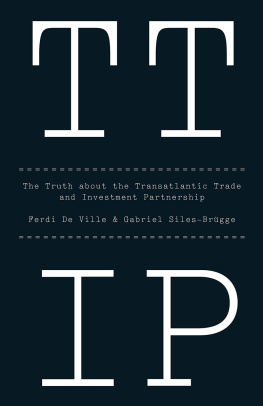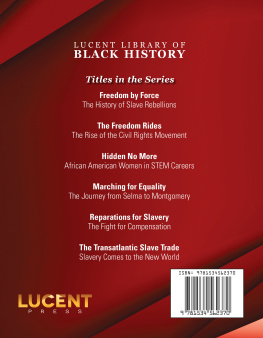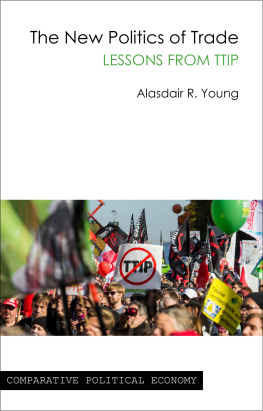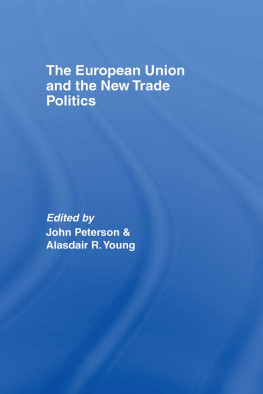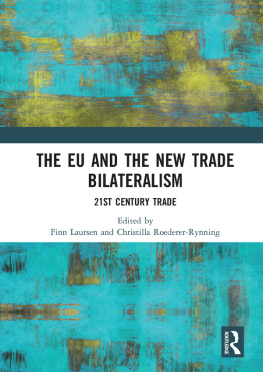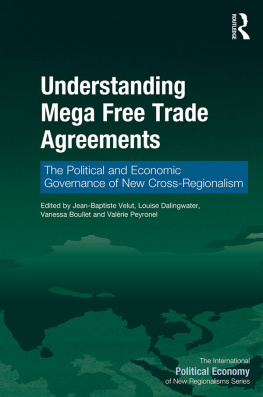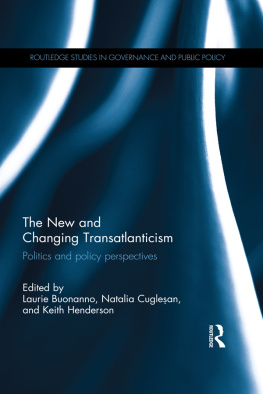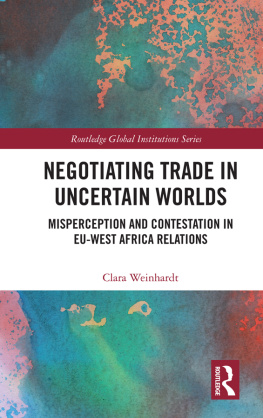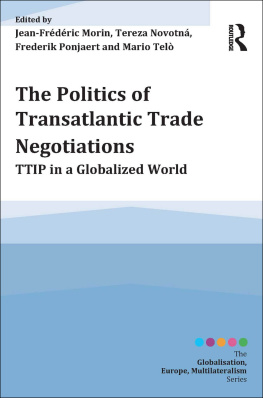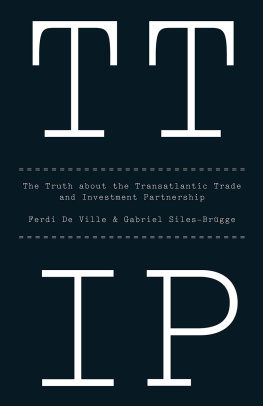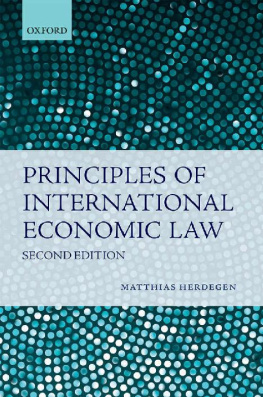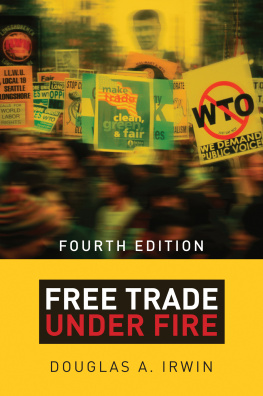Contents
Guide
Print Page Numbers

For Merel and Larissa
TTIP
The Truth about the Transatlantic Trade and Investment Partnership
Ferdi De Ville and Gabriel Siles-Brgge
polity
Copyright Ferdi De Ville and Gabriel Siles-Brgge 2016
The right of Ferdi De Ville and Gabriel Siles-Brgge to be identified as Authors of this Work has been asserted in accordance with the UK Copyright, Designs and Patents Act 1988.
First published in 2016 by Polity Press
Polity Press
65 Bridge Street
Cambridge CB2 1UR, UK
Polity Press
350 Main Street
Malden, MA 02148, USA
All rights reserved. Except for the quotation of short passages for the purpose of criticism and review, no part of this publication may be reproduced, stored in a retrieval system, or transmitted, in any form or by any means, electronic, mechanical, photocopying, recording or otherwise, without the prior permission of the publisher.
ISBN-13: 978-1-5095-0105-2
A catalogue record for this book is available from the British Library.
Library of Congress Cataloging-in-Publication Data
Ville, Ferdi de.
T.T.I.P. : the truth about the transatlantic trade and investment partnership / Ferdi De Ville, Gabriel Siles-Brgge.
pages cm
Includes bibliographical references and index.
ISBN 978-1-5095-0101-4 (hardback) -- ISBN 978-1-5095-0102-1 (pbk.)
1. European Union countries--Foreign economic relations--United States.
2. United States--Foreign economic relations--European Union countries.
3. North Atlantic Region--Economic integration. I. Siles-Brgge, Gabriel. II. Title.
HF1532.5.U6V55 2015
382.911821--dc23
2015019452
The publisher has used its best endeavours to ensure that the URLs for external websites referred to in this book are correct and active at the time of going to press. However, the publisher has no responsibility for the websites and can make no guarantee that a site will remain live or that the content is or will remain appropriate.
Every effort has been made to trace all copyright holders, but if any have been inadvertently overlooked the publisher will be pleased to include any necessary credits in any subsequent reprint or edition.
For further information on Polity, visit our website:
politybooks.com
Abbreviations
ACTAAnti-Counterfeiting Trade AgreementAFL-CIOAmerican Federation of Labour and Congress of Industrial OrganizationsATTACAssociation for the Taxation of Financial Transactions and Aid to CitizensBEUCBureau of European Union Consumer OrganisationsBITbilateral investment treatyCEOCorporate Europe ObservatoryCEPRCentre for Economic Policy ResearchCETAEU-Canada Comprehensive Economic and Trade AgreementCGEcomputable general equilibriumDGDirectorate-GeneralECIEuropean Citizens InitiativeEDCendocrine disrupting chemicalEPEuropean ParliamentEPAEnvironmental Protection AgencyESFEuropean Services ForumETUCEuropean Trade Union ConfederationEUEuropean UnionFDAFood and Drug AdministrationFQDFuel Quality DirectiveFTAfree trade agreementGATSGeneral Agreement on Trade in ServicesGATTGeneral Agreement on Tariffs and TradeGDPgross domestic productGMOgenetically modified organismHLWGHigh Level Working Group on Jobs and GrowthIAimpact assessmentIABImpact Assessment BoardINTAInternational Trade Committee of the European ParliamentISDSinvestor-to-state dispute settlementMAIMultilateral Agreement on InvestmentMEPMember of the European ParliamentMRAmutual recognition agreementMRLmaximum residue levelNAFTANorth-American Free Trade AgreementNATONorth Atlantic Treaty OrganisationNGOnon-governmental organisationNHSNational Health ServiceNTANew Transatlantic AgendaNTBnon-tariff barrierNTMnon-tariff measureOIRAOffice of Information and Regulatory AffairsOSHAOccupational Safety and Health AdministrationRCBregulatory cooperation bodyREACHRegulation on the Registration, Evaluation, Authorisation and Restriction of ChemicalsREFITRegulatory Fitness and Performance ProgrammeRoHSRestriction of Hazardous Substances DirectiveS2BSeattle-to-Brussels NetworkSMEsmall and medium-sized enterpriseSPSsanitary and phytosanitary (measures)TABDTransatlantic Business DialogueTACDTransatlantic Consumer DialogueTAFTATransatlantic Free Trade AreaTBTtechnical barriers to tradeTNITransnational InstituteTPATrade Promotion AuthorityTPNTransatlantic Policy NetworkTPPTrans-Pacific PartnershipTRIPSAgreement on Trade-Related Intellectual Property RightsTSCAToxic Substances Control ActTTIPTransatlantic Trade and Investment PartnershipUEAPMEEuropean Association of Craft, Small and Medium-Sized EnterprisesUNECEUnited Nations Economic Commission for EuropeUSUnited StatesUSTRUnited States Trade RepresentativeWEEEDirective on Waste Electrical and Electronic EquipmentWTOWorld Trade Organisation
Acknowledgements
A lot has happened since we first discussed doing collaborative research on the Transatlantic Trade and Investment Partnership (TTIP), the trade agreement currently being negotiated between the European Union (EU) and the United States (US). We were both attending an academic conference being held in the European Parliament back in April 2013. Much like other trade nerds, we were not quite expecting the negotiations to generate as much interest as they have over the past couple of years. Lets face it, trade policy is often seen as an extremely technical, acronym-laden, even soporific area of politics, best left to bureaucrats. While Ferris Bueller has his day off school in the cult 1980s film bearing his name, his history teacher bores the class with a lesson on US tariff policy during the Great Depression (although this in itself is also not an unimportant issue, as we touch upon in the book). At dinner parties and other social gatherings, neither of us was used to talking at much length about what we do in our day jobs. And yet trade policy increasingly has important consequences for our everyday lives, not only influencing the price of the goods we consume but, rather, also increasingly shaping the way in which our governments can take action against the health, social and environmental risks we face in our societies. This is why the debate surrounding TTIP which is all about how trade agreements impact on the ability of governments to regulate in the public interest is so welcome. Trade is too important just to be left to the experts. The knowledge shown by participants at the many events we have attended over the past two years from street protests to debates at the European Parliament gives us hope that the days where trade is seen as boring are numbered.
As a result, we are extremely grateful to the editorial team at Polity for this opportunity to write about TTIP for a broader audience. Our editor, Louise Knight, not only strongly encouraged us to pursue this project in the first place but has shown a level of interest, dedication and guidance at every stage which we could have only hoped for. We would also like to thank Pascal Porcheron for his excellent editorial assistance, including just the right amount of prodding to ensure we delivered the manuscript in a reasonably timely fashion. While the manuscripts reviewers provided a number of insightful comments that helped greatly in finessing the books argument, a number of other people took time out of their busy schedules to read parts of the manuscript (or the text in its entirety) and/or offer feedback in other extremely helpful ways. We feel that it is only right that we thank them here: Tony Heron (who also got us thinking about the distinction between normative and distributive trade conflict), Niels Gheyle, Henrik Hermansson, Joelle Dumouchel, Sacha Dierckx, Nicolette Butler, Dorte Sindbjerg Martinsen, Donna Lee, Jean-Christoph Graz, Jens Ladefoged Mortensen, Yelter Bollen, Marjolein Derous and Stijn Van Wesemael. Any remaining errors are our sole responsibility. Similarly, we would like to thank all those who agreed to be interviewed for this book whom we are unable to name in the interest of preserving their anonymity and all those individuals who have discussed TTIP with us over the last couple of years and who have immensely enriched our understanding of trade politics. In addition, a big thank you is owed to the University of Manchester Press Office (especially Mike Addelman) and the people at Policy@Manchester (in particular Alex Waddington) for helping us to communicate our research on TTIP to a wider audience.

